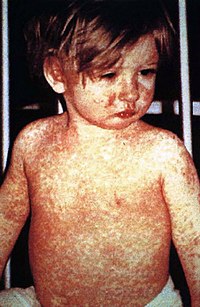
Photo from wikipedia
Current treatment options for diabetic neuralgia are limited and unsatisfactory. Tanezumab, a monoclonal antibody that blocks nerve growth factor (NGF) signaling, has been shown to be effective in relieving the… Click to show full abstract
Current treatment options for diabetic neuralgia are limited and unsatisfactory. Tanezumab, a monoclonal antibody that blocks nerve growth factor (NGF) signaling, has been shown to be effective in relieving the clinical symptoms of osteoarthritis pain, chronic low back pain, cancer pain induced by bone metastasis, and diabetic neuralgia. However, the clinical development of tanezumab has been terminated due to the risk of induction of rapidly progressive osteoarthritis (RPOA), and no other NGF antibodies have been examined for their ability to treat diabetic neuralgia in either animal models or clinical trials. In this study, a humanized high‐affinity NGF monoclonal antibody (mAb), huAb45 that could neutralize the interaction between NGF and its high‐affinity receptor TrkA. In a mouse diabetic neuralgia model, it effectively relieved neuropathic pain. This study may serve as the necessary foundation for future studies of huAb45 to potentially treat diabetic neuralgia.
Journal Title: FEBS Open Bio
Year Published: 2022
Link to full text (if available)
Share on Social Media: Sign Up to like & get
recommendations!